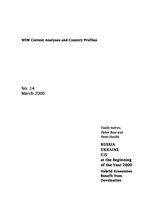Russia - Ukraine - CIS at the beginning of the year 2000. Hybrid economies benefit from devaluation
Vasily Astrov, Helen Boss Heslop and Peter Havlik
wiiw country profile No. 14, March 2000
Russia
The crisis that hit Russia in August 1998 turned out to be the major economic and political shock since the collapse of the Soviet Union in December 1991; it is having far-reaching and lasting consequences. The country was thrown several years back and is again on the threshold of default. Moreover, the idea of liberal reforms and co?operation with the West has been largely discredited. Even after successful negotiations with the International Monetary Fund and the Paris and London Clubs of creditors on foreign debt restructuring, debt service payments will still constitute a substantial portion of federal spending in the coming years, thus reducing the ability of the state to provide public goods and weakening federal powers still further. At the same time, the economic damage of the crisis proved to be smaller than feared. Hyperinflation could be avoided, and the domestic economy has started to recover quite strongly, taking advantage of the weak rouble. Post-crisis Russian governments have pursued policies aimed at preserving the status quo until the parliamentary and especially presidential elections.
Ukraine
Ukraine entered the first quarter of the 21st century with a newly re-elected president, a new cabinet of ministers led by the country's main reform politician, and a considerably less obstructionist parliament. President Kuchma appears to have gambled and won. Ukraine's 'dinosaur' left lost the presidential election in October/November, and the referendum scheduled for 16 April will further weaken its ability to block economic legislation. The post-Yeltsin Russian elite appears to have accepted Ukraine's independence and its 'European orientation' as a fact of life. The political conditions for tackling urgent economic problems appear to be in place.
However, nearly a decade has been wasted. There are no quick fixes for the economy: only slow, steady commitment to budget-hardening, fairness-enhancing measures can attract investment for growth and bring the shadow economy out of the shadows. It may take years to see the benefits of proposals to disband collective farms, reduce energy consumption and impose market-economy type sanctions such as bankruptcy workouts on enterprises who fail to pay wages, energy bills or taxes on time or in cash. But after eight years of 'fake' reform, there is at last some evidence that the government's top economy ministers understand what must be done, and that only the market can do it.
CIS The financial crisis that began with the crash of the Russian rouble in August 1998 had severe contagion effects in the rest of the CIS, but they appear to be abating. Most states achieved positive GDP growth in 1999. Political developments in Russia, Ukraine and elsewhere augur well for a new if unspectacular effort at budget-hardening reform, necessary to prevent further marginalization of the region. Caspian oil and gas projects may pick up steam in 2000-01, given the turnaround in energy prices.
Countries covered: CIS, Russia, Ukraine
Research Areas: Macroeconomic Analysis and Policy
